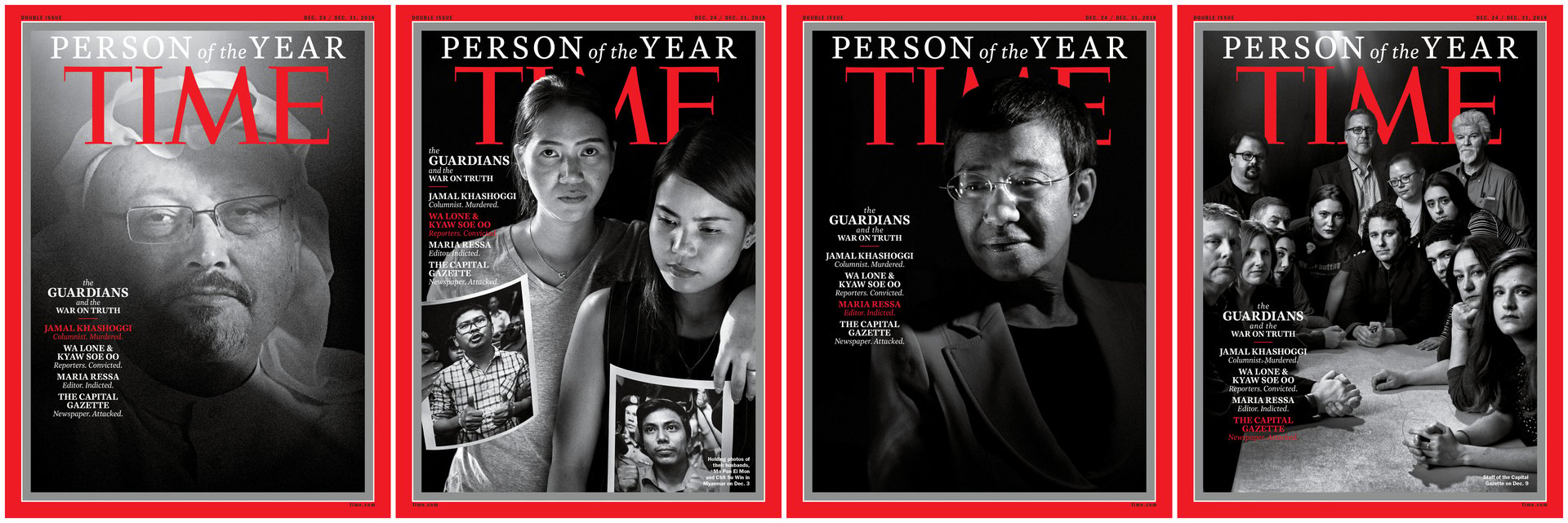Time magazine’s “guardians of the truth,” in their own words
A global war on truth is afoot. In Donald Trump’s view, it pits the American people versus their enemy: journalists, and the “fake news media.” For Time magazine, and many others, it’s journalists who are the guardians of truth, safeguarding it from an onslaught of alternative facts and misinformation.


A global war on truth is afoot. In Donald Trump’s view, it pits the American people versus their enemy: journalists, and the “fake news media.” For Time magazine, and many others, it’s journalists who are the guardians of truth, safeguarding it from an onslaught of alternative facts and misinformation.
Time announced its 2018 Person of the Year today (Dec. 11)—four individuals and one group. All are journalists who placed their lives or freedom on the line to expose “the manipulation and the abuse of truth” around the world:
- Saudi dissident and Washington Post columnist Jamal Khashoggi, who was brutally killed in October by shadowy Saudi operatives
- Filipina journalist Maria Ressa, whose work for Rappler has made her a legal target facing 10 years in prison
- The staff of the Capital Gazette group in Maryland that lost five colleagues to a newsroom attacker
- Reuters journalists Wa Lone and Kyaw Soe Oo, whose work on the massacre of Rohingya Muslims has left them in prison in Myanmar for almost a year
Here, in their own words, are the heart of their stories.
The staff of the Capital Gazette
From an open letter to readers after the death of their colleagues Rob Hiaasen, Wendi Winters, Gerald Fischman, John McNamara, and Rebecca Smith:
We won’t forget being called an enemy of the people.
No, we won’t forget that. Because exposing evil, shining light on wrongs and fighting injustice is what we do.
We are The Capital. We are the Maryland Gazette. We are the Bowie Blade-News and Crofton West County Gazette. We are more than just our questions and our writing and our headlines.
We are journalists.
Yes, we bring values and beliefs to our work. We believe in truth. We believe in speaking for those who don’t have the power to speak for themselves. We believe in questioning authority.
We believe in reporting the news.
Wa Lone and Kyaw Soe Oo
From the investigative project that resulted in their imprisonment:
Reuters has pieced together what happened in Inn Din in the days leading up to the killing of the 10 Rohingya–eight men and two high school students in their late teens.
Until now, accounts of the violence against the Rohingya in Rakhine state have been provided only by its victims. The Reuters reconstruction draws for the first time on interviews with Buddhist villagers who confessed to torching Rohingya homes, burying bodies and killing Muslims.
This account also marks the first time soldiers and paramilitary police have been implicated by testimony from security personnel themselves. Members of the paramilitary police gave Reuters insider descriptions of the operation to drive out the Rohingya from Inn Din, confirming that the military played the lead role in the campaign.
The slain men’s families, now sheltering in Bangladesh refugee camps, identified the victims through photographs shown to them by Reuters. The dead men were fishermen, shopkeepers, the two teenage students and an Islamic teacher.
Rappler editor Maria Ressa
Speaking at a Committee to Protect Journalists event where she was honored:
This is an existential moment for global power structures, turned upside down by technology. When journalists globally are under attack. When power structures are shifting…
We need to continue reporting without fear or favor. And—you heard these words here last year from my former colleague Christiane Amanpour—”we need to be truthful, not neutral”…You don’t really know who you are until you’re forced to fight to defend it. Then every battle you win—or lose, every compromise you choose to make, or to walk away from—all these struggles define the values you live by, and, ultimately, who you are.
We at Rappler decided that when we look back at this moment a decade from now, we will have done everything we could: We did not duck, we did not hide. We are Rappler, and we will hold the line.
Jamal Khashoggi
From a Washington Post column about a year before his death:
When I speak of the fear, intimidation, arrests and public shaming of intellectuals and religious leaders who dare to speak their minds, and then I tell you that I’m from Saudi Arabia, are you surprised?
With young Crown Prince Mohammed bin Salman’s rise to power, he promised an embrace of social and economic reform. He spoke of making our country more open and tolerant and promised that he would address the things that hold back our progress, such as the ban on women driving.
But all I see now is the recent wave of arrests. Last week, about 30 people were reportedly rounded up by authorities, ahead of the crown prince’s ascension to the throne. Some of the arrested are good friends of mine, and the effort represents the public shaming of intellectuals and religious leaders who dare to express opinions contrary to those of my country’s leadership…
It was painful for me several years ago when several friends were arrested. I said nothing. I didn’t want to lose my job or my freedom. I worried about my family.
I have made a different choice now. I have left my home, my family and my job, and I am raising my voice. To do otherwise would betray those who languish in prison. I can speak when so many cannot. I want you to know that Saudi Arabia has not always been as it is now. We Saudis deserve better.